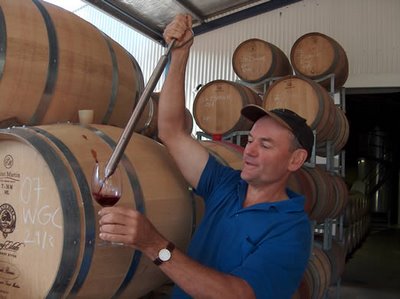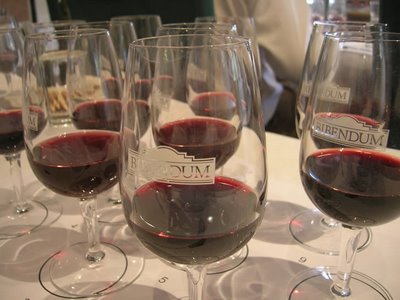Advanced tasting part 1, the eyes
Advanced tasting
Tasting begins with the eyes. Colour is important in wine. It sounds silly, but the taste experience we have is quite heavily influenced by visual cues.
An introduction to wine course, with a difference, in blog format by leading UK wine journalist Jamie Goode

It’s no good just reading this, because it will rapidly be lost in some dark corner of your memory, never to resurface. To understand what I’m getting at, you need to be reading this glass in hand. If this isn’t appropriate or possible now, then make a mental note to come back to this page on a suitable occasion when you can actually drink.
Have you got a glass in front of you? Now go back to the list of questions above. Think about what you are drinking: it may help to have a notepad to hand to jot down and make sense of your thoughts.
Tasting takes time, especially if you aren’t experienced. I find the analogy of a Turkish carpet shop helpful. For most people, the taste experience is like looking at a rolled up carpet. You can tell it’s a carpet, but not much else about what it’s really like; in a similar vein, to most people a glass of wine is wine, usually either white or red, and dry or sweet. For many others, the taste experience is like leafing through a stack of plied up carpets. Now you can see a bit of the pattern, but not too much.
But if you take the time, and think about what you are dinking in a semi-analytical way, as you gain experience it will be like taking a carpet and unrolling it across the floor: suddenly the entire pattern becomes apparent. But there’s an uncertainty – and imprecision – associated with the senses of taste and smell: so however experienced we are, it’s often as if we are studying the carpet in the dim light of a back street shop in Istanbul with a pushy salesman at our elbow. We just have to live with this imprecision.
 It’s also important to bear in mind that our perception of wine itself – how it ‘tastes’ – changes with experience. As you drink wine thoughtfully, you’ll begin to ‘get’ it better. It will say more to you. And your taste preferences will also likely shift. This is worth bearing in mind if you are planning to build up a cellar of bottles: I know chums who have bought enthusiastically the sorts of wines they liked when they were first developing into geeks, only for their preferences to change, leaving them with a cellar of wines in a style they no longer cared for.
It’s also important to bear in mind that our perception of wine itself – how it ‘tastes’ – changes with experience. As you drink wine thoughtfully, you’ll begin to ‘get’ it better. It will say more to you. And your taste preferences will also likely shift. This is worth bearing in mind if you are planning to build up a cellar of bottles: I know chums who have bought enthusiastically the sorts of wines they liked when they were first developing into geeks, only for their preferences to change, leaving them with a cellar of wines in a style they no longer cared for.First, let’s begin with three key introductory points:
I believe that you’ll have more fun with wine if you know a bit about it, which is the reason I’m writing this course. I’m assuming, though, that you don’t just want knowledge for the sake of it, and you don’t want to have to spend hours reading through a huge doorstop of a textbook. I’m also aware that entering the world of wine for the first time can be daunting. There’s simply too much information to absorb. Relax! The truth is, you are never going to know everything about this subject. Don’t be even the tiniest bit gutted by this revelation; rather, be relieved. The wine world is just so huge and changes so rapidly that it’s no longer possible for any one person to be a real expert on all the world’s wines (although some claim to be; dig deeper and you’ll find areas where their knowledge is superficial, or out of date, or both).
Good news: you can learn a bit at a time, slowly building up your knowledge base. Even better news: you don’t have to learn by reading large books – instead, you can learn on the job.
Last year I had my first experience of flying, and it was great, because as soon as we were up in the air I was given the stick and told what to do. I was flying, and I hadn’t looked at a single book or had any lessons on the ground. I didn’t have much clue about what I was doing, but that’s the way to learn. You move the stick, you feel its effects. Hence the goal of this course is to encourage you to drink wine, and think about it as you drink, picking up the relevant information at the same time. In that way, you’ll really learn, and what you learn will be useful.
First, though, you must leave you fear of getting it wrong behind. So many people come to wine scared stiff of making mistakes or being made to look stupid. I’ll let you in on a secret: almost all wine ‘experts’ are pretending that there are more absolutes and more certainty than there really is. In truth, much of what passes for the body of knowledge in wine is made up, imaginary and passes on from generation to generation without really being challenged. Experts don’t like to admit how incomplete and uncertain their knowledge really is, because there’s a risk that they’d be taken less seriously. It’s really OK to question things, even things said by experts.